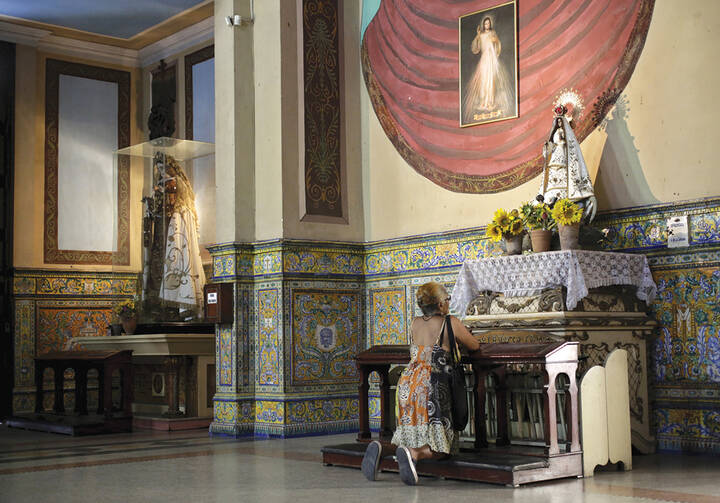The president of the Latin American bishops’ conference called Pope Francis’ planned visit to Cuba an opportunity for the church to play a larger role in a country experiencing reforms and re-embracing institutionalized religion.
“Whether we want to accept it or not, Cuba is undergoing a transformation. In this transformation, the institution with the highest expectations from Cuba society to provide a response is the Catholic Church,” said Archbishop Carlos Aguiar Retes of Tlalnepantla, Mexico, president of the Latin American bishops’ conference, known by its Spanish acronym CELAM.
“The church continues being an entity with a presence across the island, with small groups, but it’s there,” said the archbishop, whose archdiocese covers the northern suburbs of Mexico City.
Federico Lombardi, S.J., the Vatican spokesman, has confirmed that Pope Francis will travel to Cuba in September, visiting the island prior to his three-city tour of the United States on Sept. 22–27. This will be the second time in less than four years that a pontiff will travel to the Caribbean country. Pope Benedict XVI visited in 2012.
The visit comes as Cuba and the United States work to re-establish diplomatic relations and build stronger economic ties. Pope Francis played a role in the reconciliation. He urged both sides to start talking, and the Vatican hosted secret talks between U.S. and Cuban officials.
The coming trip will be another opportunity “to promote this opening between the United States and Cuban governments,” Archbishop Aguiar said, adding that the church has long been concerned about the state and fate of Cuba.
Cuba is considered one of the least Catholic countries in Latin America and the Caribbean, with just 27 percent of the population professing the faith, according to a survey by Univision and Fusion. The small number of professed Catholics is a consequence of a policy of secularism imposed by the Communist leadership after the 1959 revolution. The Cuban church is small, but it has been regaining ground since St. John Paul II visited in 1998 and restrictions on religion were loosened.
“Cuban society, regrettably, lost its religiosity. It was beaten back into an individual religiosity” expressed in forms like Santeria, Archbishop Aguiar said. “If the Cuban Catholic Church is supported, is accompanied at this time, when there is this transformation of the Cuban society, the Catholic Church could regain its significant presence.”
Pope Francis has also announced plans to visit three South American countries—Ecuador, Bolivia and Paraguay—in July.
The trips reinforce the vision outlined in a document edited by the pope when he was archbishop of Buenos Aires, Argentina, at the Fifth General Conference of the Bishops of Latin America and the Caribbean in Aparecida, Brazil, in 2007. The document appealed to Catholics on the continent to make missions a priority and came partly in response to the precipitous decline in the Catholic population of many countries.
“What Aparecida proposed was to go out for [people], that we don’t stay satisfied attending to those that have come [to church], rather that we be willing to go for those who are distant or those that have fallen away or those that are indifferent, but continue being Catholic,” Archbishop Aguiar said. “It’s a gigantic challenge because our mentality, particularly clerical, isn’t made for this.”
By visiting three of the poorer countries on the continent, the pope is continuing his policy of putting peripheral places at the center of church life, said Archbishop Aguiar. “These are three countries that don’t count much in the Latin American outlook,” he said. “They’re small with many problems, historically difficult constitutions, particularly Bolivia and Paraguay. When the pope says, ‘Go to the periphery,’ he also means going to peripheral countries.”








